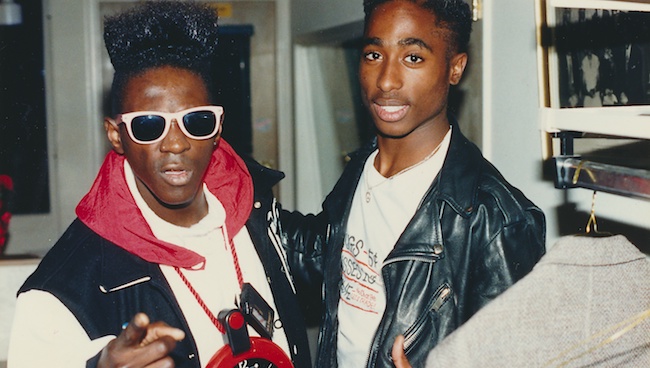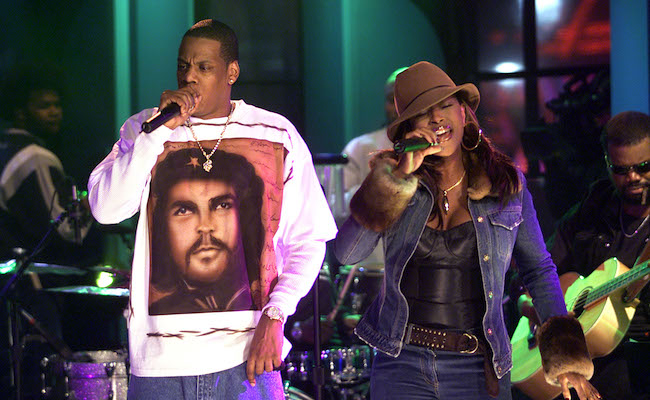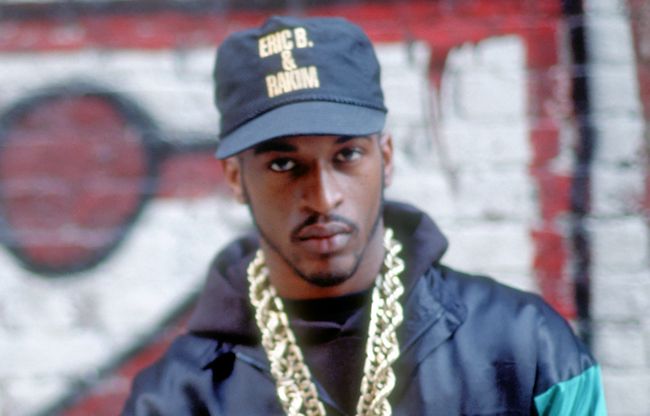
To celebrate the airing of the Rock And Roll Hall Of Fame induction this Saturday, 4/29, we’re running a series of essays and feature analyzing and highlighting the implications of who was inducted in 2017.
Imagine a place that houses DJ Kool Herc’s turntables, Rakim’s microphone, Flavor Flav’s clock, Tupac’s bandana, Biggie Small’s Versace shirt, Jay Z’s Yankee fitted and so many more iconic hip-hop artifacts. This place could honor the latest and greatest acts in the genre each year, as well as pay homage to those from past eras and serve as a monument meant to celebrate the little genre that could, that eventually became a worldwide phenomenon and pop chart mainstay. Imagine that instead of waiting for enshrinement into the Rock and Roll hall of fame, rappers, DJs, producers and everybody else contributing to the culture could be enshrined into the Hip-Hop Hall Of Fame.
It’s time to make this a reality.
With Tupac Shakur’s induction into the Rock Hall of Fame this year, he becomes just the sixth rapper to be recognized, and the first solo rap performer following Run-D.M.C., Grandmaster Flash & the Furious Five, the Beastie Boys, Public Enemy and N.W.A. — not that he needed their approval to be considered a rockstar. The Hall’s eligibility rules require 25 years since a performer’s debut album before they are eligible for enshrinement, and Pac’s induction is just the beginning of what should be a plentiful decade for rappers and the Hall. Biggie, Nas, Jay Z, DMX, Snoop Dogg, Dr. Dre, the Wu-Tang Clan and many more made their debuts during the so-called Golden Era or hip-hop in the mid 1990s, and their eligibility should open the floodgates for hopeful inductees.
That flood of artists reaching eligibility signals the perfect time for a Hip-Hop Hall of Fame, and the still relatively new genre has been around long enough to fill its own physical hall that could serve as a museum for the genre. Born in the ’70s, hip-hop was thought to be a passing fad, even when it began to cross over in the late ’80s and early ’90s. Much like the performers within the genre, hip-hop persisted, and despite protests and political pressure it continued to increase its relevance world-wide.
Now, the genre is a mainstay without not only music, but pop culture in general. It scores the films we enjoy, helps advertise the products we buy, it outfits people of all ages and socio-economic backgrounds and has become synonymous with being cool — just like rock and roll did decades before. Hip-hop has permeated American culture, and even spread throughout the globe. With nearly 40 years on the books it shows no signs of slowing up. Hip-Hop isn’t a phenomenon anymore, it’s a mainstay. Hip-Hop is pop music, it’s pop culture and it’s there permanently.

The actual hall would likely need a few benefactors or help from a city like the Rock Hall has, but there are plenty of wealthy rap pioneers and legends that could lend a hand. Jay Z and Diddy are of course seen as the cream of the crop, but the likes of Dr. Dre, Eminem and 50 Cent have become financial success stories in their own right, and would probably be willing to pitch in as well. A host of rap’s entrepreneurs may want to be involved, like Russell Simmons, Andre Harrell, Steve Stoute and more. Money won’t be the problem. But will there be interest?
In 2016, Hip-Hop and R&B made up for 22% of all total music consumption in the world according to Nielsen. That number — which includes albums, track equivalent albums and streaming equivalent albums — was second only to the 29% share Rock made up, and nearly two times the 13% share of pop music. On Soundcloud’s 2016 year-end report, the most popular album, song and artist were all from rap, giving the genre reign over the digital world as well.
So yes, the interest is there, and the genre has a rich, 40-year history worth chronicling and with its own self-sustaining ecosystem that’s certainly lucrative and influential enough to warrant honoring in this way. Obviously, the most logical location for the hall would be The Bronx, the birthplace of hip-hop. The structure could be erected there and filled with artifacts and monuments from the genre’s history, as well as a comprehensive library of the works of acts spanning hip-hop’s timeline.

According to Cleveland.com, the Rock and Roll Hall of Fame has contributed over $2 billion to the Northeast Ohio area since 1995. With enough nurturing and a solid infrastructure a Hip-Hop Hall could contribute to the New York economy in a similar fashion. Though yearly revenues have declined in recent years, the Rock Hall has remained profitable, and it’s valuation is over $90 million, and Cleveland.com surmised revenue losses were related to a $7 million renovation plan earlier this decade.
The benefactors that invest into the Hip-Hop Hall of Fame could stand to earn their make money back not only from the day-to-day ticket revenue, but merchandising, television rights for ceremonies, special attractions throughout the year, and plenty more. Funds could also be diverted to public programs throughout New York and the country celebrating, promoting and educating the youth on the art form that is hip-hop. The hall would stand to help preserve and promote the legacy of hip-hop while setting up the foundation to continue doing so for years to come. The genre is worth it, and has been for some time, so now is the time it’s recognized as such.
Much like the Rock Hall, the panelists who choose inductees could be made up of academics, journalists, rappers, producers, executives and others involved in and with experience in the genre of rap. The criteria could mirror the rock hall as well, or take some liberties to include more recent acts from the ’90s. Or, they could stick to their criteria, and spend the first few classes recognizing legends from the ’70s and ’80s while the ’90s acts wait for their eligibility to come to fruition.
With hip-hop stars now gradually becoming a part of the Rock Hall, their place in music’s history is undeniable. These artists are pieces of the foundation of music and pop culture as we know it today, and should be recognized as such. A Hip-Hop Hall of Fame would be the perfect place to do so, and though a place in the Rock Hall is a start, the true end goal should be to establish an identity and foothold in the industry as it’s own, sustainable entity. Hip-Hop has done so financially, and culturally, now it’s time to do so historically.






